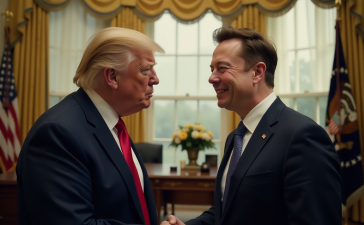When the US supreme court overturned Roe v Wade in 2022, Republicans across the country cheered. Freed from Roe’s regulations, GOP lawmakers promptly blanketed the US south and midwest in near-total abortion bans.
But today, after a string of electoral losses, stories of women being denied abortions and polls that confirm abortion bans remain wildly unpopular, the political calculus has changed. Republicans are now trying to slow down the car whose brakes they cut – and to convince voters that, if the car crashes, they had nothing to do with it anyway.
Nowhere encapsulates the GOP’s backpedal on abortion better than Arizona, whose state supreme court on Tuesday ruled to let an 1864 near-total abortion ban go into effect. That ban, which outlaws abortion in all cases except to save the life of a woman, was passed before Arizona became a state, before the end of the civil war and before women gained the right to vote.
Kari Lake, a Republican running to represent Arizona in the US Senate and a diehard ally of Donald Trump, once called that ban “a great law”. But on Tuesday, the inflammatory politician became one of several GOP officials to denounce the ruling, urging the state legislature to “come up with an immediate commonsense solution that Arizonans can support”. On Wednesday, Trump also indicated that he thought Arizona’s near-total ban – whose revival was enabled by a US supreme court ruling he has repeatedly taken credit for – had gone too far. “It’ll be straightened out and, as you know, it’s all about states’ rights,” he said.
Republican state lawmakers denounced the decision, but halted an effort by Democrats on Wednesday to repeal the law, instead voting to move to a recess to prevent a vote on the matter.
Abortion remains banned past 15 weeks in Arizona, since the 1864 ban is being held up by legal delays. But Arizona is expected to be a key battleground state in the 2024 elections, and abortion-rights supporters have gathered more than half a million signatures in support of a ballot measure to enshrine abortion rights in the state constitution. Democrats are hoping that measure will boost turnout and bring their candidates – including Joe Biden – to victory.
In other words, this ban threatens to become a political nightmare for Republicans come November.
Lake and Trump are caught in the quandary that is now facing Republicans in Arizona and beyond its borders. For 50 years, the GOP became increasingly wedded to the anti-abortion movement, passing restrictions that cut off access to the procedure and littering the courts with lawsuits to overturn Roe. These restrictions won them votes from anti-abortion advocates, as well as cash from influential advocacy groups. But because Roe stopped many of these restrictions from taking effect, it shielded Republicans from reckoning with the real-world consequences of anti-abortion policies – or with the outrage of voters. Since Roe was overturned, and those real-world consequences have come into focus, abortion rights-related ballot measures have succeeded in several Republican strongholds, including Kansas and Kentucky.
Lake didn’t say what that “commonsense solution” might be, but other Republicans have tried to take a stab at it. Juan Ciscomani, who represents Arizona in the US House, called the decision no less than “a disaster” and claimed he was a “strong supporter of empowering women to make their own healthcare choices”. He also, in the same statement, said the 15-week ban “protected the rights of women and new life”.
This seems to be the party line that many Arizona Republicans are now congealing around: they will support a 15-week ban, which the state legislature first passed in 2022, but not a near-total ban. This, too, is a gamble. Last year, when Virginia Republicans tried to take control of the state legislature by proposing to “compromise” and ban abortion past 15 weeks of pregnancy, they fell short.
Yet the post-Roe electoral firepower of abortion has never been tested in a presidential election. Biden has spent months trying to blame abortion bans on Trump, since Trump appointed three of the justices who overturned Roe. Trump, meanwhile, alternates between congratulating himself for overturning Roe, both rebuking and flirting with the idea of a national ban, and claiming, as he did earlier this week, that abortion access should now be left up to the states.
For Republicans, the only option may be to take a cue from their party’s leader and rewrite their own history. When asked about Lake’s previous support for the 1864 ban, her campaign suggested to the New York Times that Lake was referring to a different law.
But in the comments praising it, Lake even referred to the 1864 ban by its statute number, 13-3603. “I’m incredibly thrilled that we are going to have a great law that’s already on the books,” she said.










